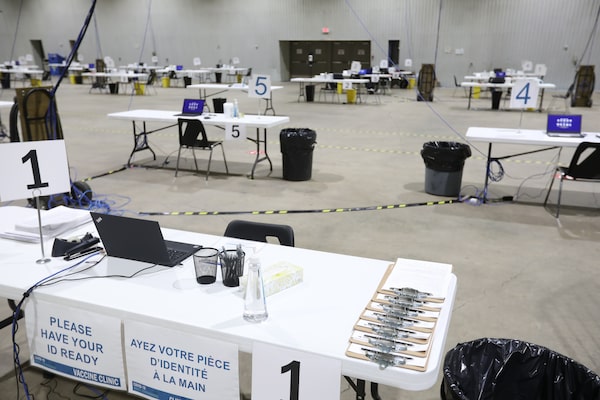
Intake stations are seen during a tour of the COVID-19 immunization supersite in Brandon, Man., in January, 2021.Tim Smith/The Canadian Press
A new medical research series calls on Canada to conduct an independent inquiry into the country’s COVID-19 response, citing Canada’s failures in the equity of its domestic and global health deliverance.
The BMJ’s international editor Dr. Jocalyn Clark commissioned the series from Canadian experts to look in-depth into key issues in Canada’s pandemic response, including leadership, co-ordination and data sharing between provincial territorial and federal entities, equity research, the high death rate among nursing homes and Canada’s global contribution to vaccine sharing.
“These in-depth analyses are important because they help draw lessons about what went wrong, where were the missteps, how can these be prevented in the future and how can we be better prepared for the next health crisis or public-health emergency in the future,” Dr. Clark said.
The BMJ Canada COVID Series included medical experts from 14 institutions across seven provinces and found Canada’s pandemic response suffered from fragmented health leadership across the federal, provincial and territorial governments.
Canada’s pandemic performance varied, Dr. Clark wrote in her editorial, because of “inconsistency in decision making, inadequate data infrastructure and sharing, and misalignment of priorities.”
“My impression was that a lot of Canadians or observers thought that Canada overall did pretty good in the pandemic,” Dr. Clark said, noting that country’s inequalities become more clear once you take a closer look.
André Picard: Should Canada conduct a national COVID response inquiry? The BMJ thinks so
Dr. Clark said Canada’s pandemic response failed to protect those with known vulnerabilities, including people living and working in long-term care facilities, Canadians from racialized groups, essential service workers including immigrants, and people living in crowded or inadequate housing.
In the first two waves of the pandemic, 80 per cent of deaths due to COVID-19 in Canada were from people living are working in long-term care facilities, giving Canada the worst record of any country in the world, Dr. Clark said.
One of the lead authors Dr. Sharon Straus, a physician researcher and chief of medicine at St. Michael’s Hospital at Unity Health Toronto, said in comparison to other health care workers, long-term care home staff who contracted COVID-19 were more likely to live in lower income neighbourhoods with higher density and more likely to live with other essential service workers.
Dr. Straus said public-health entities and provinces that had more ready access to this type of data during the pandemic were better able to tailor their responses and create better solutions over time, such as pop-up vaccine clinics in lower income areas.
Canadian physician and medical researcher Dr. David Naylor said the problem wasn’t a lack of research during the pandemic, but putting existing information into action.
“Epidemics and pandemics have predictably hit some populations much harder than others. Some public health units were better at targeting their measures than others, but we just didn’t get that right consistently enough during COVID-19,” Dr. Naylor wrote in an e-mail to The Globe and Mail.
Dr. Naylor did agree that public-health leaders and practitioners need to identify and connect with high-risk populations and determine “what unique steps can be done to protect them when the next infectious threat arrives.”
Dr. Clark said the series concludes that Canada was not prepared for the COVID-19 pandemic, even after reviews into previous health emergency responses, such as the Naylor Report into the 2003 SARS outbreak lead by Dr. Naylor.
“20 years on, this new series is raising some of the same concerns: that we don’t have strong enough public health and health care systems, that we weren’t prepared for this pandemic, that vulnerable people are impacted the most,” Dr. Clark said.
Dr. Naylor said this series has shown a spotlight some of the key areas that need to be carefully examined to ensure Canada is better prepared for the next pandemic. “With any luck, they will help catalyze proper reviews by both federal and provincial authorities,” he said.
An independent inquiry into Canada’s COVID-19 response is an opportunity, Dr. Straus said, for Canada to reflect, learn and prepare for the next public-health emergency, while also ensuring accountability to recommendations that are made.
The structure and mandate of how an inquiry takes shape is what is most important, Dr. Naylor said, and making sure independent panels look at federal responses separately from each provincial response.
“They need to look hard at what went well, what didn’t go well, why we underperformed and what needs to be done to do better next time,” Dr. Naylor said.
“And there will be a next time – probably much sooner than any of us would like.”